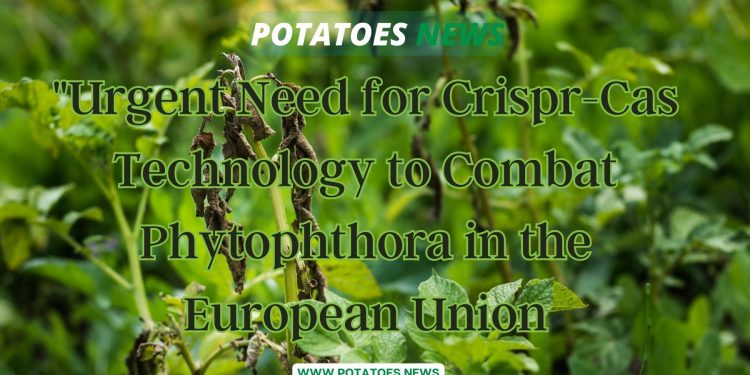The agricultural landscape in the European Union faces a growing crisis as the destructive phytophthora disease wreaks havoc on potato crops. Hendrik Jan ten Cate, a board member of the Dutch agricultural organization LTO, emphasizes the pressing need for the adoption of new breeding techniques like Crispr-Cas. This article delves into the alarming situation caused by phytophthora and explores the imperative for immediate action.
The Phytophthora Menace:
Phytophthora, a notorious plant pathogen, has been causing severe damage to potato crops across the European Union. Reports from various regions indicate that the disease is becoming uncontrollable, forcing early termination of potato crops. This destructive pathogen not only threatens crop yields but also impacts the quality of the harvested potatoes.
Inadequate Control Measures:
The traditional arsenal of pesticides and control measures is proving increasingly ineffective against the new and more aggressive strains of phytophthora. With the phasing out of broad-spectrum chemicals like mancozeb, potato growers are left with limited options such as Revus, Zorvec, Infinito, and Ranman. However, these options often fall short in the face of the escalating infection rates, necessitating frequent spray intervals of two to three days.
Devastating Consequences:
The consequences of battling phytophthora are profound. Prematurely spraying and uprooting potato crops in September, a crucial growth period, can result in yield losses of up to 20 percent. Furthermore, underdeveloped potato fields tend to have subpar underwater weight, significantly affecting their suitability for various purposes, including baking. The problems caused by phytophthora are not confined to consumption potatoes alone; they also impact seed potatoes and starch potatoes.
The Need for Genetic Solutions:
Hendrik Jan ten Cate argues that a sustainable solution to the phytophthora crisis lies in incorporating multiple resistances into potato varieties. While the agricultural sector is actively pursuing traditional breeding methods, the path to developing effective resistant strains is long. To address the urgent need, Ten Cate urges the adoption of modern genetic technologies like Crispr-Cas, which can swiftly introduce multiple resistances.
Unlocking Crispr-Cas Potential:
The expertise and technologies required for implementing Crispr-Cas already exist at institutions like Wageningen University & Research. Genetic modification through Crispr-Cas can provide a rapid solution to the phytophthora problem. However, the European Union must expedite the approval and adoption of these cutting-edge techniques.
Conclusion:
The phytophthora crisis in the European Union demands immediate attention and action. The inadequacy of current control measures, coupled with the devastating consequences on crop yields and quality, necessitates the rapid adoption of advanced breeding techniques like Crispr-Cas. It is crucial for governments and regulatory bodies to work in harmony with the agricultural sector to ensure food security and sustainability.
Take Action:
To address the phytophthora crisis effectively, it is imperative that:
- Governments expedite the approval of Crispr-Cas technology for crop improvement.
- Funding and support are allocated to research institutions to develop phytophthora-resistant potato varieties.
- Farmers are educated and encouraged to implement advanced disease management practices.
#Agriculture #CropProtection #GeneticModification #FoodSecurity #EU #PhytophthoraControl #SustainableAgriculture #CrisprTechnology #PotatoCrisis #CropResilience
The European Union seeks to protect crops, increase food security, and promote sustainable agriculture through the use of genetic modification, phytophthora control, and CRISPR technology, with the potato crisis serving as an example of the need for crop resilience.







